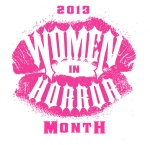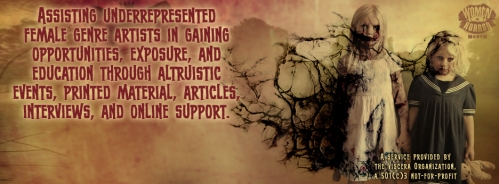Women in Horror Month is sponsored by the Viscera organization and today’s Canadian woman of horror is Barbie Wilde who has also been a female cenobite. And if you know Clive Barker’s work, you know what that means. Some of her recent fiction credits include “Sister Cilice,” Hellbound Hearts anthology (edited by Paul Kane & Marie O’Regan, Pocket Books), “U for Uranophobia,” Phobophobia (ed. Dean M. Drinkel, Dark Continents Publishing), “American Mutant: Hands of Dominion,” Mutation Nation (ed. Kelly Dunn, Rainstorm Press), “Polyp,” The Mammoth Book of Body Horror (ed. Paul Kane & Marie O’Regan, Constable Robinson). New works to come out this year are: “A is for Alpdrücke,” Demonologia Biblica (ed. Dean M. Drinkel, Western Legends Publishing), “Beauty and the Skell,” The Screaming Book of Crime (ed. Johnny Mains, Screaming Dreams), “The Cilicium Pandoric” for The Followers of the Pandorics.
The Venus Complex is Barbie’s debut dark crime novel.
Her debut dark crime novel, The Venus Complex, published by Comet Press, November 2012 received some great reviews: Ginger Nuts of Horror – Books of the Year 2012: “This brilliant look into the mind of a serial killer is full of poetic anger and beautiful vitriolic ranting that it makes you wonder from which pit of hell the lovely Barbie came from. In a genre saturated with bland serial killers, and even blander plots, this book shines out like a beacon.” HorrorTalk – Top Books of 2012: “A novel by a female Cenobite that gives the world a smart, artistic, cynical, cultured serial killer who could give Hannibal Lecter a run for his money. On top of that, this is a poignant, funny, sexually-charged, hardcore critique of popular culture and a deconstruction of relationships, academia, and art.”
BARBIE WILDE
1. Why do you write dark fiction/horror? Some people consider it only a sensationalistic tableau. Why this genre over others or do you span the literary landscape?
I suppose that the dark side has always interested me, even as a child. Instead of the “girlie” books my mother encouraged me to read, I devoured the SciFi and Fantasy tales that my brother and father were reading. My father introduced me to Sherlock Holmes at an early age and I was fascinated by the character of Moriarty – the bloated spider crouching at the center of Victorian London’s crime world. Early viewings of The Twilight Zone, The Outer Limits and Film Noir also influenced me.
Even my early female TV role models were a bit dangerous: Morticia, Mrs. Peel from The Avengers and detective Honey West. I loved the freedom that these characters enjoyed. Maybe that’s why I chose the unconventional life of an actress before I became a writer–eventually moving to London, England and ending up in such movies as Hellraiser II and Death Wish III.
Barbie Wilde
2. What dark themes do you explore in your fiction?
As a writer, I’ve always been intrigued by transgressive themes, including the sexual mindscape of art history professor Michael Friday, who decides to become a serial killer in The Venus Complex. I loved getting into my lead character’s mind, as uncomfortable as it was, and delving into psychological horror, art and eroticism. And writing in the first person from a male perspective was very “interesting,” to say the least!
In my short story, “Uranophobia,” I used the themes of child abuse and the phobias of a shut-in to tell the story. In another short story, “Sister Cilice,” I explored the sexual frustration and isolation of a nun. However, in “Polyp” I just wrote about a giant colonic polyp terrorizing a hospital. Now that was fun to write!
3. Do you feel horror/dark fiction is an important genre and why; what does it bring to the table or allow you to explore? Who inspired you?
I think that it’s a very important genre that’s extremely popular with the general public. Horror is part and parcel of the human experience. And although I write horror, I don’t consider myself a horror writer. I’m a writer, pure and simple. (After all, one person’s horror is another person’s crime novel, or literary fiction novel, etc.)
As mentioned above, I’ve always been fascinated by the shadows in life rather than the sunlight. Certainly as an actress, it’s always much more fun to play the baddies than the goody-two-shoes. (And didn’t we all love Arnie a little bit more when he was the Bad Terminator? And what about that special affection that Darth Vader holds for millions of people?) So writing about so-called “evil” characters is far more interesting to me. (By the way, I hate using the word “evil.” Humans are humans. There are no supernatural forces making us bad, in my opinion – just the extraordinary scope, length and breadth of humanity.)
Inspiration: What truly inspires me is human behavior — good, bad, indifferent — we are such interesting creatures!
Barbie as a female Cenobite.
Inspiring artists: I love Clive Barker’s work – his writing is so muscular, sexy, funny and imaginative. I admire true crime writer Colin Wilson. I think that Red Dragon and American Psycho are two of the best books about serial killers I’ve read. (However, the original Psycho is still my favorite serial killer movie.) I love Rod Serling for his genius. I love stories and books by Paul Kane, Shirley Jackson, Margaret Atwood and Sarah Pinborough. I admire the Soska Sisters for their audacious films. And last but not least, I love Quentin Tarantino for being a “silver-penned devil,” as actor Christoph Waltz recently called him at the BAFTA Awards 2012.
4. Do you feel women are under represented in any way in the speculative arena or do you think there is more focus on them than on men? (or examples of how there is a balance)
It appears that there are plenty of women writing in the genre, which seems to be a pretty healthy sign to me.
Something like 3.5 million books were released last year – not including Kindle versions – which is a pretty devastating statistic whether you’re a male or a female writer! However, it is a man’s world and some of us will always be fighting to get our voices heard.
5. Abuse against women is worldwide: the gang rape of the Indian woman, women assaulted in various terrorist attacks or protests against regimes (Egypt, Syria, etc. throughout time), domestic violence and murder at the hands of boyfriends, fathers, families and husbands, sexist representation, being treated as second class citizens or possessions and made to dress in a particular way, etc. With all that’s going on, what do you want to say about where women are and what we can do to stem the tide?
As mentioned above, it’s a man’s world – even now, after all the battles to get our right to vote, own property, etc. And although your examples of Third World cruelty towards women are valid, there are a lot of things to continue to fight for in the Western World: one only has to cast one’s mind back to the recent American election–when some right-wing politicians were saying some outrageous things about rape–to be reminded of the primitive mindset of a lot of people throughout the world.
It’s a difficult job to try and change the way men’s (and some women’s) minds work, but only legislation and more importantly education can turn the tide. Of course, religion (one of the biggest culprits in the propagation of women as second class citizens) is another obstacle. I remember seeing the head of the American Catholic Lay Association on CNN some years ago. He said that the reason women couldn’t become priests was that it was Eve’s fault that we all got thrown out the Garden of Eden. Gobsmacking.
However, trying to wean people off the “addictions” of religion, superstition and tradition will not be easy. I can only hope that at some point, people will just want to live in peace with each other, no matter what sex, or religion, or political party, or sexual orientation they belong to. (Unfortunately, the ideology of Star Trek: The Next Generation is still centuries in the future!)
For more info, reviews and interviews, please go to: www.barbiewilde.com




Pingback: Women in Horror: Barbie Wilde « Dig women
Pingback: Fiend: The Shocking True Story of America’s Youngest Serial Killer by Harold Schecter | Rafferty's Rules
Pingback: Lyall Watson in ‘Dark Nature’ quoted in ‘Fiend: The Shocking True Story of America’s Youngest Serial Killer’ by Harold Schechter | Rafferty's Rules
Pingback: The Horror Genre: Ya Gotta Love It... - Mikes Film Talk